- Home
- Lisa Kleypas
Devil's Daughter Page 16
Devil's Daughter Read online
Page 16
Now there would be no expectations, no longing, no hope on either side. Now he didn’t have to fear that he might go to her in a moment of weakness. She would leave tomorrow, and everything would go back to the way it was. He would find a way to forget her. The world was full of women.
Years would pass, while he and Phoebe led separate lives. She would marry and have more children. She would have the life she deserved.
Unfortunately, so would he.
After an abysmal night of broken sleep, West awakened with a lump of ice in his stomach. He felt as if someone had parked a traction engine on his chest. Slowly he went through the rituals that began every morning. He was too numb to feel the heat of the towel he used to soften his beard before shaving. As he passed the unmade bed, he was tempted to climb back into it, fully clothed.
Enough of this, he told himself grimly. It was unmanly, this moping and languishing. He would go about his day as usual, starting with breakfast. The sideboard would be laden with broiled chops, eggs, rashers of bacon and ham, potatoes hashed with herbs and fried in butter, bread puddings each in its own puddle of sauce, a platter of crisp radishes and pickles on ice, dishes of stewed fruit from the orchard topped with fresh cream—
The thought of food was nauseating.
West paced, sat, stood and paced some more, and finally stopped at the window with his forehead pressed against a cool pane of glass. His room afforded a view of the stables and carriage house, where vehicles and horses were being readied to take the Challons to the estate’s private railway halt.
He couldn’t let Phoebe leave like this, hating him, thinking the worst of him. He didn’t know how things should be left between them, but not this way.
He thought of what Pandora had told him the day before the wedding, that she didn’t feel she deserved to marry a man like Lord St. Vincent. “There’s nothing better than having something you don’t deserve,” he’d replied.
What a flippant ass he’d been. Now he understood the terrible risk and pain of wanting someone far above your reach.
West went downstairs to the study, where the books he had shown Phoebe yesterday had been arranged in stacks on the table. Sorting through the volumes, he found the one he wanted and pulled it out. He sat at the table and reached for a pen and inkwell.
Fifteen minutes later, he headed back upstairs with the book in hand. He didn’t stop until he had reached the threshold of Phoebe’s room. There were noises from within, drawers opening and closing, a trunk lid banging on the floor. He heard Phoebe’s muffled voice as she spoke to her maid.
His heart was thrashing like a caged lark. Gingerly he knocked at the door. The sounds inside the room stopped.
Soon the door opened, and a lady’s maid regarded him with raised brows. “Sir?”
West cleared his throat before saying gruffly, “I’d like to speak with Lady Clare—briefly—if I may.” After a pause, he added, “I have something to give her.”
“One moment, sir.” The door closed.
Almost a full minute passed before the door opened again. This time it was Phoebe. She was dressed in traveling clothes, her hair drawn up tightly and pinned in an intricately braided coil high at the back of her head. She looked tense and tired, her complexion ghost pale except for the flags of bright pink at the crest of each cheek. The lack of color only served to emphasize the striking angles of her jaw and cheekbones. People would fall in love with that remarkable face before they even realized how much more there was to love beneath the façade.
“Mr. Ravenel,” she said coolly, without quite meeting his gaze.
Feeling like an idiot, West extended the book to her. “For you to keep.”
Phoebe took it and glanced down at the title. “The Modern Handbook for Landed Proprietors,” she read in a monotone.
“It’s full of good information.”
“Thank you, how thoughtful,” she said distantly. “If you’ll excuse me, I must finish packing—”
“What happened yesterday—” West had to pause for an extra breath. His lungs felt half their usual size. “I misled you about why I did it. It wasn’t to prove you still had those feelings. I wanted to prove you had those feelings for me. It was selfish and stupid. I shouldn’t have taken liberties with you.”
Frowning, Phoebe stepped out into the hallway, closed the door, and glanced at their surroundings to check for privacy. She looked directly at him then, her eyes light and piercing. “I wasn’t offended by that,” she said in a low, nettled tone. “It was the way you behaved afterward, so smug and—”
“I know.”
“—so arrogant—”
“I was jealous.”
Phoebe blinked, seemingly taken aback. “Of Edward?”
“Because you’re going to marry him.”
Her brows lowered. “I’ve made no decisions about that. With all I have to face when I move back to Clare Manor, marriage will hardly be at the forefront of my mind.”
“But your promise to Henry . . .”
“I didn’t agree to sacrifice my own judgment,” she said curtly. “I promised to consider the idea because it was what Henry wanted. But I may never marry at all. Or I may marry someone other than Edward.”
The idea of some unknown man courting Phoebe, making love to her, made West long to put his fist through the wall. “I hope you’ll find someone worthy of you,” he muttered. “To my regret, I have nothing to offer other than a relationship that would insult and lower you.”
“Indeed? You seem marriageable enough to me.”
“Not for you,” he said without thinking, and immediately regretted it as he saw her face. “I didn’t mean—”
“I see.” Her voice could have sliced a green apple. “You desire me only as a mistress and not a wife. Is that it?”
The conversation was not going at all in the direction West had expected. “Neither,” he said hastily. “I mean, both.” He wasn’t making sense. “Damn it!” After a hard swallow, he turned ruthlessly, painfully sincere. “Phoebe, you’ve always been sheltered from men like me. You’ve never had to face the consequences of someone else’s sordid past. I wouldn’t do that to you, or the boys. They need a father to live up to, not one they would have to live down. As for me—I’m not meant for marriage. And if I were, I’d never take a wife so far above me in every way. I’m aware of how small-minded that is, but even men with small minds know their limits.”
“I’m not above you,” Phoebe protested.
“You’re too perfect to be entirely human. You belong to some higher order—not quite an angel, but close. No woman in my life, before or after you, will ever thrill me as you do. I don’t know what to call this. But I do know you should be worshipped by a man who’s earned the right—and that man is not me.” He paused. “I’ll take the cat now.”
“Wh-what?” Phoebe asked dazedly.
“The cat. Put her in a basket and I’ll take her back to the barn. Unless you want to keep her.”
“No, I . . . thank you, no, but—”
“Go get her. I’ll wait.”
Seeming disoriented, Phoebe disappeared, leaving the door ajar. Soon she returned with a large, lidded basket, a few plaintive mewls slipping through the woven reeds.
West took it from her. “When you leave, I won’t be there to see the carriage off. I can’t. If I try to say good-bye, I’m sure to do something that would embarrass us both.”
“Wait,” Phoebe began, sounding breathless, “I need to ask—”
West didn’t want to hear whatever it was. He couldn’t bear it. Keeping the basket tucked in one arm, he reached out with his free hand, clasped the soft nape of her neck, and kissed her. He felt her lips tremble beneath his. The delicious warmth of her response stole through him, melting through the frozen despair. Finally, he could take a deep breath again. He savored her full, sweet mouth, pulling and teasing the silkiness, stealing as much of her taste as he could. He wanted to spend years kissing her. Instead he finished with a strong nud
ge and let go of her.
“Let’s forget about that one too,” he said, his voice slightly hoarse. And he left her while he was still able, carrying away the protesting cat in the basket.
“You can’t go anywhere,” Devon said, when West told him he was heading out to the barn. “The Challons will be leaving soon—you’ll want to bid them farewell.”
“No, I won’t,” West replied shortly, still holding the unhappy cat in the basket. “I’m going to stay away until I’m sure they’re gone.”
His older brother scowled. “I thought you might accompany them out to the railway halt.”
“I’m accompanying this vicious cat back to the barn.”
“What should I tell the duke if he remarks on your absence?”
“There are only three reasons anyone ever needs me around here,” West said sourly, “when something is broken, overflowing, or mired in a bog. Use one of those. I guarantee the Challons won’t give a damn whether I’m here or not.”
“Did you quarrel with Lady Clare? Is that why you appeared to be sitting on a hedgehog all through dinner?”
West’s lips twitched despite his bad mood. “Is that how it looked? I assure you, I wasn’t nearly that comfortable.”
Devon’s frown eased. “You can’t outrun your problems.”
“Actually, I can,” West said, walking away with the basket. “Look—I’m doing it right now.”
“Have you tried being honest with her about your feelings?” came Devon’s voice from behind him.
“Sweet mother of God, can you hear yourself?” West asked without turning around. “I’d get more manly advice from Kathleen.”
He exited the back of the house and didn’t stop walking until he’d reached the group of farm buildings. The familiar sights and rhythms of the farm helped to restore his balance and blunt the sharp edges of misery. The coming days would be filled with no end of hard physical work, which would hopefully exhaust him enough to let him sleep at night.
After reaching the hay barn, he gently set the basket on the ground, lifted the lid, and tipped out the little black cat, who hissed and gave him a baleful stare.
“Sorry, Galoshes,” he said. “It’s back to work for both of us. Go catch some mice.”
The cat slunk away.
West went to the blacksmith’s shop, where Stub and some of the men were busy repairing a broken axle. They had raised a heavy cart with a set of differential pulley blocks to reach the broken parts beneath. Although they didn’t need his help, nor was there a good reason for him to stay and watch, he lingered as long as possible. Every few minutes he consulted his pocket watch, which finally prompted Stub to ask good-naturedly, “Are we not moving lively enough for you, Mr. Ravenel?”
West smiled slightly and shook his head, replacing the watch. “I want to make certain the guests have left before I go back.”
Neddy glanced at him with cheerful interest. “What o’ the red-haired widder and that little brush o’ a lad?” he dared to ask. “Didn’t you wish to see ’em off, sir?”
“Lady Clare is a rare, fine woman,” West replied ruefully. “Too fine for me, unfortunately. With her, it would be the cart before the horse, and I’m not a man to walk behind the cart.”
There was a rumble of agreement among the men. But Neddy ventured, “Myself, I don’t care if I’m at the tail of the cart, as long as my wife keeps us on the straight road.” They all chuckled.
“Naither would I mind, if the wife was sweet to look upon,” Stub declared. “And the widow Clare’s a proven breeder: you’d get healthy kittlin’ off such a good cat.”
Although West knew the comment hadn’t been meant disrespectfully, he gave Stub a warning glance to indicate the subject was closed. After the axle had been removed from the cart, West walked back to Eversby Priory. The morning had risen cool and blue. A good day for traveling.
He followed the graveled path around the side of the house to take a glance at the front drive. There were no carriages, no throng of busy servants; the Challons were definitely gone. Letting out a measured breath, he went in through the front entrance.
Despite his considerable list of tasks and chores, he found himself at a loss for what to do. He felt like a tree with a center of gravity offset from its base, liable to topple in an unpredictable direction. The household bustled quietly as servants cleaned the vacated rooms and stripped linens from the beds, while others cleared the breakfast room sideboard and removed plates and flatware. West glanced down at the empty mending basket in his hand. He wasn’t sure what to do with it now.
He went to the room where Phoebe had stayed and set the mending basket near the threshold. The bed had been hastily made; the side where Phoebe had slept wasn’t quite smooth. He couldn’t resist drawing close enough to trail his fingers along the counterpane, remembering the slight, firm weight of her body, the feel of her breath on his cheek—
A plaintive drawn-out meow interrupted his thoughts.
“What the devil . . . ?” West muttered, walking around the bed. He was stunned to find the black cat there, dusty and irritable-looking. “How can you be here?” he demanded. “I just left you at the barn!”
Galoshes let out another disconsolate sound and wandered around the empty room. She must have raced to the house as soon as he’d set her free and had somehow found a way to slip inside. She jumped onto the bed and coiled at the corner of it.
After a moment, West sat on the side of the mattress. He reached for a pillow and hunted for any lingering trace of Phoebe. Discovering a faint soap-and-roses sweetness, he drew it in deeply. When his eyes opened, he found the cat staring at him, the golden eyes solemn and accusing.
“You don’t belong in her life any more than I do,” West said flatly. “You don’t even belong in a house.”
Galoshes showed no reaction, other than flicking the tip of her scraggly tail like someone impatiently drumming her fingers.
West wondered if she would keep coming back in search of Phoebe. It was impossible not to feel sorry for the skinny little creature. He let out an exasperated sigh. “If I did manage to help you reach her,” he said, “I doubt she’d keep you. God knows what will become of you. Furthermore, do you really want to live in Essex? Does anyone?”
Flick. Flick. Flick.
West considered the cat for a long moment. “We might catch them at Alton Station,” he mused. “But you’d have to go back into that mending basket, which you wouldn’t like. And we’d have to go on horseback, which you especially wouldn’t like.” An involuntary grin crossed his face as he thought of how annoyed Phoebe would be. “She would kill me. I’m damned if I’ll risk my life for a barn cat.”
But the smile wouldn’t go away.
Making the decision, West tossed aside the pillow and went to fetch the mending basket. “Choose your fate, cat. If you fight me over the basket, the adventure ends here. If you’re willing to climb in . . . we’ll see what can be done.”
“Pat-a-cake, pat-a-cake, baker’s man . . .” Evie chanted as she played with Stephen in the Challons’ private railway carriage. They occupied one side of a deep upholstered settee, with Sebastian lounging in the other corner. The toddler clapped his tiny hands along with his grandmother, his rapt gaze fastened on her face. “Make me a cake as fast as you can . . .”
Phoebe and Seraphina sat on a settee directly opposite them, while Ivo and Justin stood at a window to watch the activity on the Alton Station platforms. Since the scheduled stop was short, the Challons remained in their carriage, which was paneled in gleaming bird’s-eye maple and trimmed with blue velvet plush and gold-plated fittings. To keep the interior temperature pleasant, ice cooling trays had been set into the floor and covered with ornamental gridwork.
The nursery rhyme concluded, and Evie cheerfully began again. “Pat-a-cake, pat-a-cake—”
“My sweet,” Sebastian interrupted, “we’ve been involved in the manufacture of cakes ever since we set foot on the train. For my sanity, I beg you to ch
oose another game.”
“Stephen,” Evie asked her grandson, “do you want to play peekaboo?”
“No,” came the baby’s grave answer.
“Do you want to play ‘beckoning the chickens’?”
“No.”
Evie’s impish gaze flickered to her husband before she asked the child, “Do you want to play horsie with Gramps?”
“Yes!”
Sebastian grinned ruefully and reached for the boy. “I knew I should have kept quiet.” He sat Stephen on his knee and began to bounce him, making him squeal with delight.
Absently Phoebe returned her attention to the book in her lap.
“What novel are you reading?” Seraphina asked, looking up from a ladies’ fashion periodical. “Is it any good?”
“It’s not a novel, it was a gift from Mr. Ravenel.”
Seraphina’s blue eyes brightened with interest. “May I see?”
Phoebe handed it to her younger sister.
“The Modern Handbook for Landed Proprietors?” Seraphina asked, wrinkling her nose.
“It’s full of information I’ll need when I move back to the Clare estate.”
Carefully Seraphina lifted the front cover and read the neatly handwritten lines inside.
My lady,
When in difficulty, remember the words of our mutual friend Stephen Armstrong: “You can always swim out of quicksand as long as you don’t panic.”
Or send for me, and I’ll come throw you a rope.
—W. R.
Every time Phoebe had read those words—at least a dozen times since they’d left Eversby Priory—a giddy sensation rushed through her. It had hardly escaped her notice that West had marked sections of the book with x’s, just as she had marked Henry’s book so long ago. A sly bit of flirtation, those x’s—she was welcome to interpret them as kisses, while he could still maintain deniability.
Infuriating, complicated man.
She wished he hadn’t come to her door this morning. It would have been easier to leave Eversby Priory while she was still angry with him. Instead, he had undercut all her hurt and fury with searing honesty. He had laid bare his soul. He’d all but said he loved her.

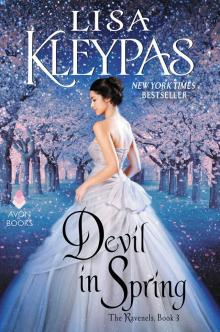 Devil in Spring
Devil in Spring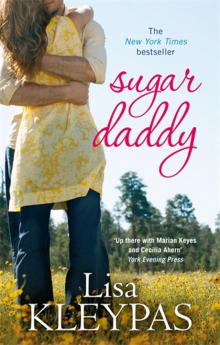 Sugar Daddy
Sugar Daddy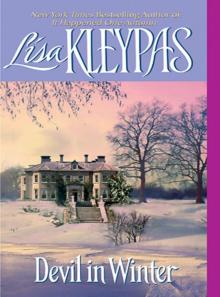 Devil in Winter
Devil in Winter Dreaming of You
Dreaming of You Christmas Eve at Friday Harbor
Christmas Eve at Friday Harbor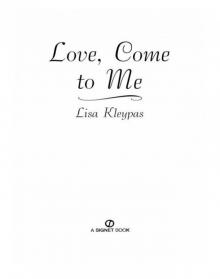 Love, Come to Me
Love, Come to Me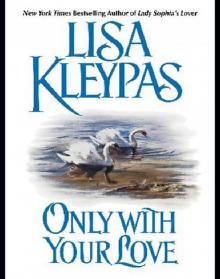 Only With Your Love
Only With Your Love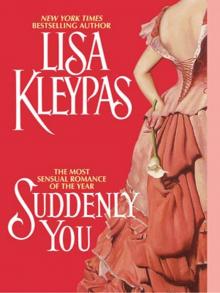 Suddenly You
Suddenly You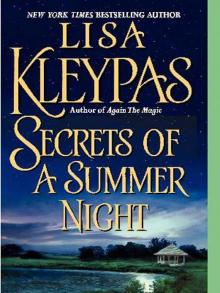 Secrets of a Summer Night
Secrets of a Summer Night Cold-Hearted Rake
Cold-Hearted Rake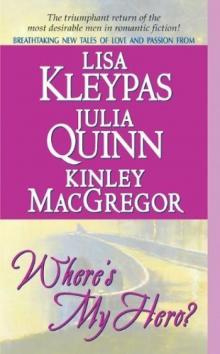 Where's My Hero?
Where's My Hero? Gifts of Love
Gifts of Love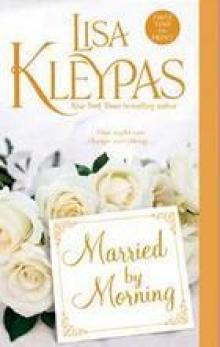 Married by Morning
Married by Morning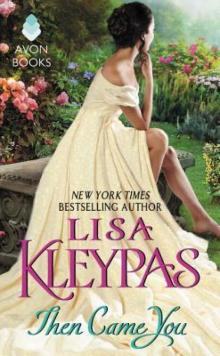 Then Came You
Then Came You Wish List
Wish List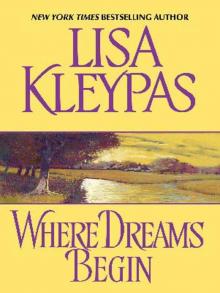 Where Dreams Begin
Where Dreams Begin A Historical Christmas Present
A Historical Christmas Present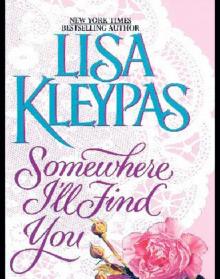 Somewhere I'll Find You
Somewhere I'll Find You Scandal in Spring
Scandal in Spring Someone to Watch Over Me
Someone to Watch Over Me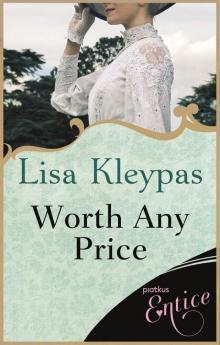 Worth Any Price
Worth Any Price Prince of Dreams
Prince of Dreams It Happened One Autumn
It Happened One Autumn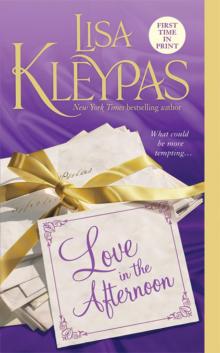 Love in the Afternoon
Love in the Afternoon Devil's Daughter
Devil's Daughter A Wallflower Christmas
A Wallflower Christmas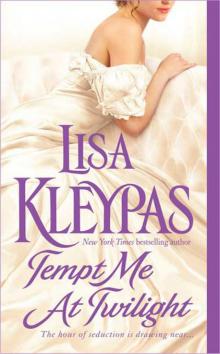 Tempt Me at Twilight
Tempt Me at Twilight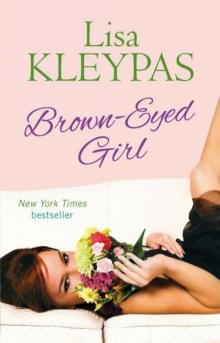 Brown-Eyed Girl
Brown-Eyed Girl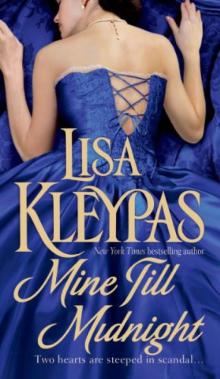 Mine Till Midnight
Mine Till Midnight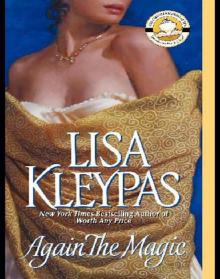 Again the Magic
Again the Magic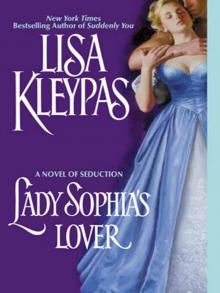 Lady Sophia's Lover
Lady Sophia's Lover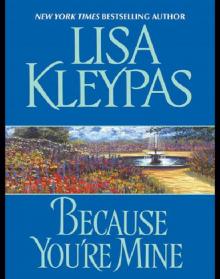 Because You're Mine
Because You're Mine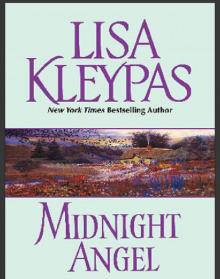 Midnight Angel
Midnight Angel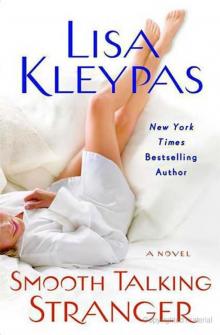 Smooth-Talking Stranger
Smooth-Talking Stranger Blue-Eyed Devil
Blue-Eyed Devil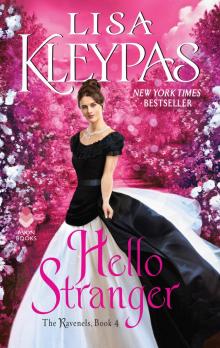 Hello Stranger
Hello Stranger Dream Lake
Dream Lake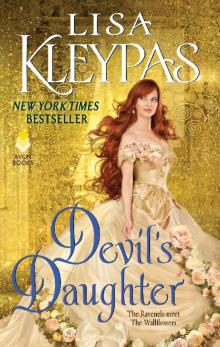 Devil's Daughter: The Ravenels Meet the Wallflowers
Devil's Daughter: The Ravenels Meet the Wallflowers A Christmas to Remember
A Christmas to Remember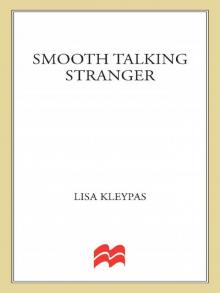 Smooth Talking Stranger
Smooth Talking Stranger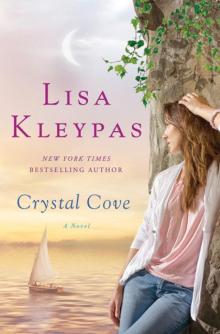 Crystal Cove
Crystal Cove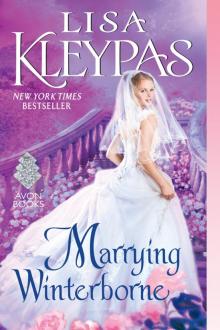 Marrying Winterborne
Marrying Winterborne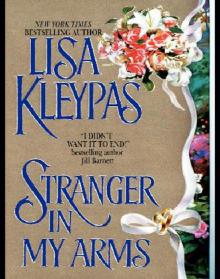 Stranger in My Arms
Stranger in My Arms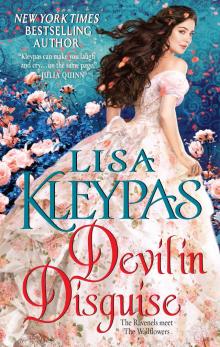 Devil in Disguise
Devil in Disguise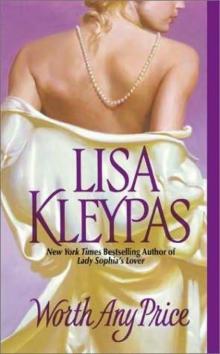 Worth Any Price bsr-3
Worth Any Price bsr-3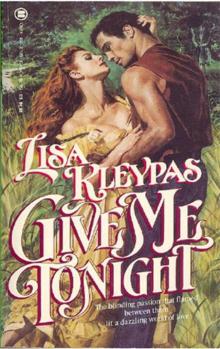 Give Me Tonight
Give Me Tonight Rainshadow Road fh-2
Rainshadow Road fh-2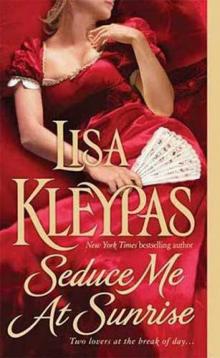 Seduce Me At Sunrise
Seduce Me At Sunrise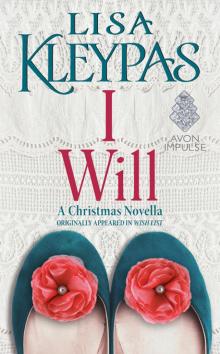 I Will
I Will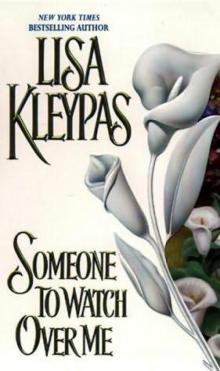 Someone to Watch Over Me bsr-1
Someone to Watch Over Me bsr-1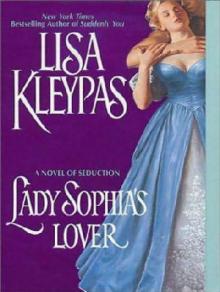 Lady Sophias Lover bsr-2
Lady Sophias Lover bsr-2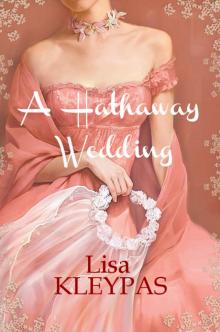 A Hathaway Wedding
A Hathaway Wedding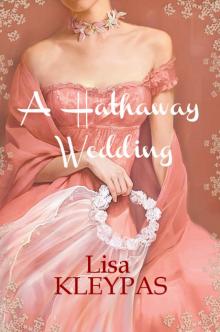 A Hathaway Wedding (Hathaways Bk2.5)
A Hathaway Wedding (Hathaways Bk2.5)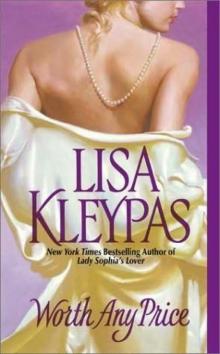 Worth Any Price - Bow Street 3
Worth Any Price - Bow Street 3 Christmas with Holly
Christmas with Holly